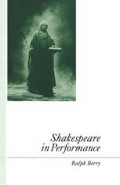Abstract
Chorus is normally an affair of doubling. Gower can usually, not always, look forward to an unshared part; Chorus in Henry V, always. But all other Shakespearean choruses and prologues are luxury castings for individual actors, which depend upon spacious production values. Certainly in Shakespeare’s day, and very generally since, the actor playing chorus will have had to combine it with at least one other part. This double will be visible, so to speak; the actor does not disguise himself as chorus; there is a transference of playing values, and the identity of the linked part has at least the possibility of inflecting chorus. We ought to know chorus’s subterranean partner, his stage sibling, and draw whatever conclusions we can.
Access this chapter
Tax calculation will be finalised at checkout
Purchases are for personal use only
Preview
Unable to display preview. Download preview PDF.
Notes
William Arrowsmith, ‘Chorus,’ in Princeton Encyclopedia of Poetry and Poetics, ed. Alex Preminger, Frank J. Warnke and O. B. Hardison, Jr. (Princeton, NJ: Princeton University Press, 1965).
The New York Times, 4 June 1966. The most extensive and penetrating review of the production is by John Pettigrew, in ‘Stratford’s Festival Theatre: 1966,’ Queen’s Quarterly, 73 (1966).
The Broken Heart by John Ford, ed. T. J. B. Spencer (London: Methuen, 1980), p. 14.
Denis Bartholomeusz, ‘The Winter’s Tale’ in Performance in England and America 1611–1976 (Cambridge: Cambridge University Press, 1982), p. 43.
Theatre at Stratford-upon-Avon: A Catalogue-Index to Productions of the Shakespeare Memorial/Royal Shakespeare Theatre, 1879–1978, compiled and edited by Michael Mullin with Karen Morris Muriello, 2 vols. (Westport, Conn.: Greenwood Press, 1980), p. 1180.
Richard David, Shakespeare in the Theatre (Cambridge: Cambridge University Press, 1978), p. 222.
Terry Hands’s RSC production of 1986 merits only a footnote. ‘I must confess to being a trifle startled when Time…arrives as an untidy-winged creature who addresses us in the accents of Churdles Ash,’ was J. C. Trewin’s reaction (Birmingham Post, 1 May 1986). David Ford saw ‘a grotesque Time who flies aloft in a somewhat tatty seagull uniform’ (Worcester Evening News, 1 May 1986).
Christopher Marlowe, Doctor Faustus: The A-Text, ed. David Ormerod and Christopher Wortham (Nedlands, Western Australia: University of Western Australia Press, 1985), 815.2–826.
W. W. Greg, Marlowe’s ‘Doctor Faustus’ (Oxford: Clarendon Press, 1950), p. 60.
E. K. Chambers, The Elizabethan Stage, 4 vols. (Oxford: Clarendon Press, 1923), ii. 547.
Christopher Marlowe, Doctor Faustus, ed. John D. Jump (London: Methuen, 1962), sc.xx lines 18–19.
See Robert Speaight, William Pod and the Elizabethan Revival (London: Heinemann, 1954), pp. 113–19. Shaw reviewed the production, without however commenting on Chorus. Our Theatres in the Nineties, 3 vols. (London: Constable, 1932), ii. 181–86.
Margaret Ingram, Stratford-upon-Avon Herald (24 July 1987).
Copyright information
© 1993 Ralph Berry
About this chapter
Cite this chapter
Berry, R. (1993). Casting the Chorus. In: Shakespeare in Performance. Palgrave Macmillan, London. https://doi.org/10.1007/978-1-349-22871-3_3
Download citation
DOI: https://doi.org/10.1007/978-1-349-22871-3_3
Publisher Name: Palgrave Macmillan, London
Print ISBN: 978-0-333-58771-3
Online ISBN: 978-1-349-22871-3
eBook Packages: Palgrave Literature & Performing Arts CollectionLiterature, Cultural and Media Studies (R0)

